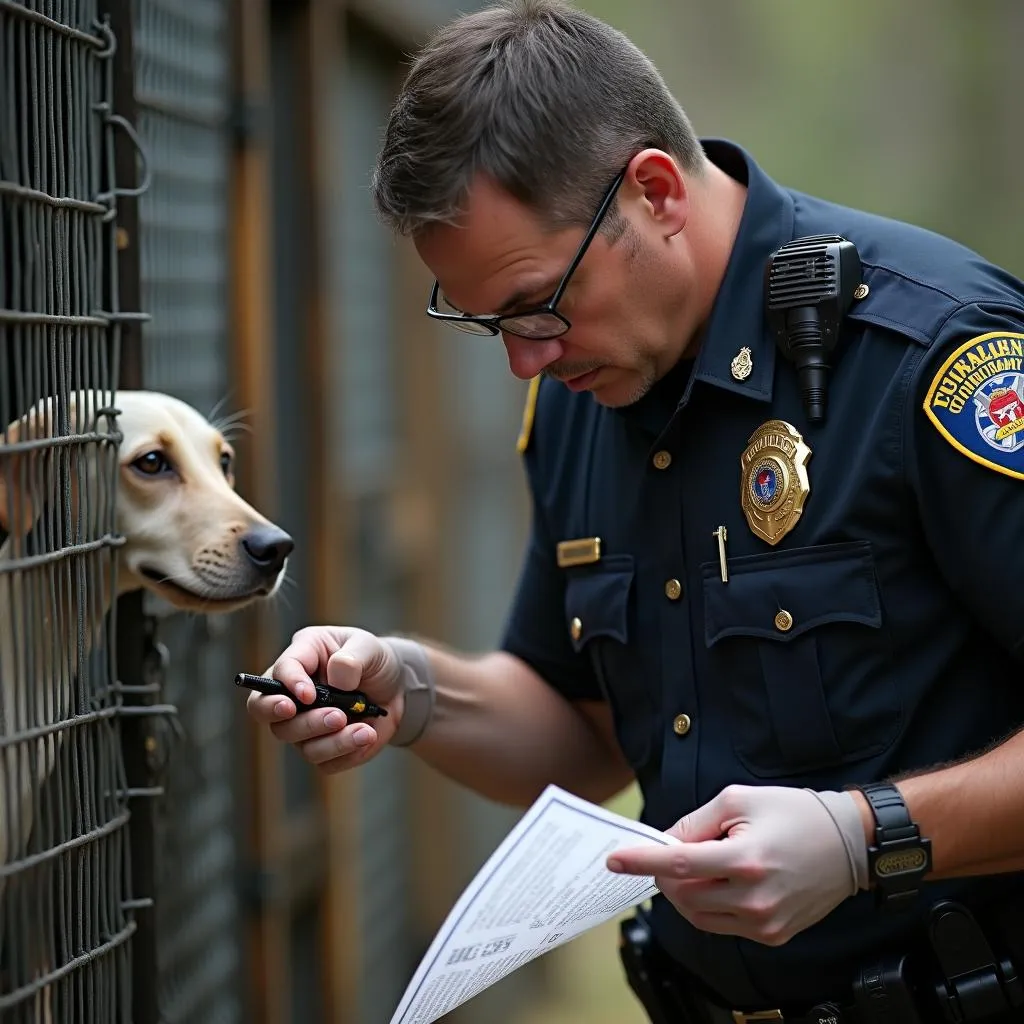The topic of animal cruelty and government regulations has been a recurring theme in IELTS Writing Task 2 exams. Based on an analysis of past exam questions and current trends, it’s likely that this subject will continue to appear in future tests. The frequency of this topic underscores its relevance in contemporary discourse and its suitability for assessing candidates’ writing skills.
Let’s examine a question that has appeared in recent IELTS exams and is representative of this theme:
Some people believe that governments should impose stricter laws on animal cruelty. To what extent do you agree or disagree?
Analysis of the Question
This question falls under the “agree or disagree” category of IELTS Writing Task 2. It requires candidates to:
- Understand the concept of animal cruelty
- Consider the role of government in regulating such issues
- Form an opinion on whether stricter laws are necessary
- Support their viewpoint with relevant examples and logical reasoning
The question allows for a nuanced response, as candidates can fully agree, partially agree, or disagree with the statement. The key is to present a clear position and support it consistently throughout the essay.
Sample Essay 1 (Band 8-9)
In recent years, the issue of animal welfare has gained significant attention, leading to debates about the need for more stringent legislation to combat animal cruelty. I strongly agree that governments should enforce stricter laws in this area, as it is crucial for protecting vulnerable creatures and fostering a more compassionate society.
Firstly, stronger legal measures can serve as a powerful deterrent against acts of animal abuse. By imposing harsher penalties, such as increased fines or longer prison sentences, governments can discourage potential offenders and send a clear message that animal cruelty will not be tolerated. For instance, in the United Kingdom, the maximum sentence for animal cruelty was recently increased from six months to five years, reflecting the growing recognition of the seriousness of these offenses.
Moreover, stricter laws can provide better protection for animals in various industries and settings. This includes not only pets but also animals in agriculture, entertainment, and research. By establishing more comprehensive regulations, governments can ensure higher standards of care and prevent exploitation. For example, legislation could mandate improved living conditions for farm animals, prohibit the use of animals in certain types of entertainment, or enforce more rigorous ethical standards in scientific experiments involving animals.
Additionally, implementing tougher animal welfare laws can have broader societal benefits. Research has shown a strong link between animal cruelty and other forms of violence, including domestic abuse and violent crimes against humans. By taking a firmer stance against animal abuse, governments can potentially address these interconnected issues and contribute to a safer, more empathetic society.
However, it is important to acknowledge that simply enacting stricter laws is not sufficient. Effective enforcement and public education are equally crucial components of any strategy to combat animal cruelty. Governments must allocate adequate resources to ensure that these laws are properly implemented and that the public is well-informed about animal welfare issues and their legal obligations.
In conclusion, I firmly believe that governments should impose stricter laws on animal cruelty. Such measures can act as a deterrent, provide better protection for animals across various sectors, and contribute to a more compassionate society. However, these efforts must be accompanied by robust enforcement and educational initiatives to truly make a lasting impact on animal welfare.
(Word count: 365)
 Strict enforcement of animal cruelty laws
Strict enforcement of animal cruelty laws
Explanation of Band 8-9 Score
This essay demonstrates the characteristics of a high-scoring IELTS Writing Task 2 response:
-
Clear position: The writer’s stance is explicitly stated in the introduction and consistently maintained throughout the essay.
-
Coherent structure: The essay follows a logical progression with a clear introduction, body paragraphs addressing different aspects, and a conclusion.
-
Well-developed ideas: Each main point is thoroughly explained and supported with relevant examples.
-
Sophisticated vocabulary: The essay uses a range of advanced vocabulary accurately (e.g., “deterrent,” “stringent legislation,” “comprehensive regulations”).
-
Complex sentence structures: The writer employs a variety of sentence structures, including complex sentences with multiple clauses.
-
Cohesive devices: Appropriate linking words and phrases are used to connect ideas smoothly (e.g., “Moreover,” “Additionally,” “However”).
-
Task fulfilment: The essay fully addresses all parts of the question, providing a nuanced perspective on the topic.
-
Tone and style: The writing maintains a formal, academic tone throughout, suitable for IELTS Task 2.
Sample Essay 2 (Band 6-7)
In today’s world, many people think that governments need to make stronger laws against animal cruelty. I agree with this idea to some extent, but I also think there are other important things to consider.
On one hand, stricter laws can help protect animals from abuse. When people know they can get big fines or go to jail for hurting animals, they might think twice before doing it. For example, in some countries, people who are caught abusing pets can now face serious punishments. This can make people more careful about how they treat animals.
Also, tougher laws can help animals in different situations, not just pets. Farm animals, animals used in shows, and those in laboratories could all benefit from better rules. If the government makes laws about how these animals should be treated, it can stop them from being hurt or used unfairly.
However, just making new laws is not enough to solve the problem completely. We also need to teach people why it’s important to be kind to animals. Many people might not understand how their actions affect animals. So, along with stricter laws, governments should also focus on education programs in schools and communities.
Another thing to think about is that enforcing these laws can be difficult and expensive. Governments need to have enough money and people to check if everyone is following the rules. Without proper enforcement, even the strictest laws won’t make much difference.
In conclusion, I believe that stricter laws against animal cruelty are a good idea, but they should be part of a bigger plan. This plan should include education and proper enforcement to really help protect animals. By doing this, we can create a society that is kinder to all living creatures.
(Word count: 298)
 School program on animal welfare
School program on animal welfare
Explanation of Band 6-7 Score
This essay demonstrates the characteristics of a mid-range IELTS Writing Task 2 response:
-
Clear position: The writer’s opinion is stated, albeit with some qualification.
-
Adequate structure: The essay has a basic structure with an introduction, body paragraphs, and conclusion.
-
Relevant ideas: The main points are relevant to the topic, though not as fully developed as in the Band 8-9 essay.
-
Appropriate vocabulary: The essay uses some topic-specific vocabulary, but with less sophistication than the higher band essay.
-
Mix of sentence structures: There is a combination of simple and complex sentences, though with less variety than the Band 8-9 essay.
-
Basic cohesive devices: Some linking words are used to connect ideas, but not as extensively as in higher band essays.
-
Task fulfilment: The essay addresses the main parts of the question, though with less depth and nuance.
-
Tone and style: The writing maintains a generally appropriate tone, though it’s slightly less formal than the Band 8-9 essay.
Key Vocabulary to Remember
- Animal cruelty (noun) – /ˈænɪməl ˈkruːəlti/ – cruel treatment of animals
- Legislation (noun) – /ˌledʒɪsˈleɪʃən/ – laws, considered collectively
- Deterrent (noun) – /dɪˈterənt/ – something that discourages or is intended to discourage someone from doing something
- Welfare (noun) – /ˈwelfeər/ – the health, happiness, and fortunes of a person or group
- Enforcement (noun) – /ɪnˈfɔːsmənt/ – the act of compelling observance of or compliance with a law, rule, or obligation
- Exploitation (noun) – /ˌeksplɔɪˈteɪʃən/ – the action or fact of treating someone unfairly in order to benefit from their work
- Empathetic (adjective) – /ˌempəˈθetɪk/ – showing an ability to understand and share the feelings of another
- Comprehensive (adjective) – /ˌkɒmprɪˈhensɪv/ – including or dealing with all or nearly all elements or aspects of something
In conclusion, the topic of government regulations on animal cruelty is likely to remain relevant in IELTS Writing Task 2 exams. To prepare effectively, practice writing essays on this and related topics, focusing on developing clear arguments, using appropriate vocabulary, and maintaining a coherent structure. Remember to analyze the question carefully and address all parts in your response.
For further practice, consider writing essays on these potential future questions:
- Some people argue that using animals for entertainment purposes, such as in circuses or zoos, should be banned. Do you agree or disagree?
- To what extent should governments regulate the treatment of animals in the food industry?
- Discuss the pros and cons of using animals in scientific research.
We encourage you to practice writing an essay on the topic discussed in this article and share it in the comments section below. This active approach to learning can significantly improve your IELTS Writing skills.


